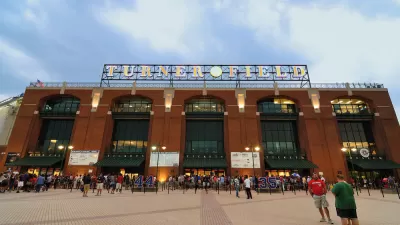After playing just 17 seasons at downtown Atlanta's Turner Field, which was built for the 1996 Olympics, the city's baseball team is giving up their urban home for a new stadium 14 miles northwest of the city.
"The Braves will leave downtown Atlanta for suburban Cobb County, after a scant 20 years in Turner Field," writes Angie Schmitt. "The team chose the nexus of two highways 13.5 miles north of their current stadium as the site for a new ballpark. According to Atlanta Mayor Kasim Reed, Cobb County offered $450 million in public support for the stadium."
Increased highway access, larger parking lots, and a desire to be closer to its car-driving suburban fan base are driving the unorthodox move. According to Reuben Fischer-Baum, writing in Deadspin, of the 18 baseball teams to embark on significant stadium moves over the last 50+ years, "just five took teams farther from their urban core, and, of those five, four were shifts of less than a third of a mile."
"There's been increasing skepticism directed toward public subsidies of professional sports venues in recent years," notes Ryan Holeywell, in Governing. "Almost universally, independent economists say they aren't a good deal for taxpayers and typically don't generate anywhere near the sort of economic impact that team owners and public officials say they do."
"'That seems pretty outlandish, extravagant, stupid -- however you want to describe it,' Dennis Coates, an economics professor at University of Maryland Baltimore County, said upon learning of the deal. 'Not for the Braves. It's a great deal for them. But politicians who go along with that, and then start screaming about fiscal responsibility -- they need to be smacked.'"
FULL STORY: Cobb County Coughs Up Big $$$ to Help Braves Leave Downtown Atlanta

Alabama: Trump Terminates Settlements for Black Communities Harmed By Raw Sewage
Trump deemed the landmark civil rights agreement “illegal DEI and environmental justice policy.”

Study: Maui’s Plan to Convert Vacation Rentals to Long-Term Housing Could Cause Nearly $1 Billion Economic Loss
The plan would reduce visitor accommodation by 25% resulting in 1,900 jobs lost.

Planetizen Federal Action Tracker
A weekly monitor of how Trump’s orders and actions are impacting planners and planning in America.

Wind Energy on the Rise Despite Federal Policy Reversal
The Trump administration is revoking federal support for renewable energy, but demand for new projects continues unabated.

Passengers Flock to Caltrain After Electrification
The new electric trains are running faster and more reliably, leading to strong ridership growth on the Bay Area rail system.

Texas Churches Rally Behind ‘Yes in God’s Back Yard’ Legislation
Religious leaders want the state to reduce zoning regulations to streamline leasing church-owned land to housing developers.
Urban Design for Planners 1: Software Tools
This six-course series explores essential urban design concepts using open source software and equips planners with the tools they need to participate fully in the urban design process.
Planning for Universal Design
Learn the tools for implementing Universal Design in planning regulations.
Caltrans
Smith Gee Studio
Institute for Housing and Urban Development Studies (IHS)
City of Grandview
Harvard GSD Executive Education
Toledo-Lucas County Plan Commissions
Salt Lake City
NYU Wagner Graduate School of Public Service



























